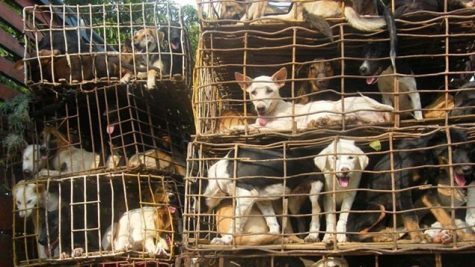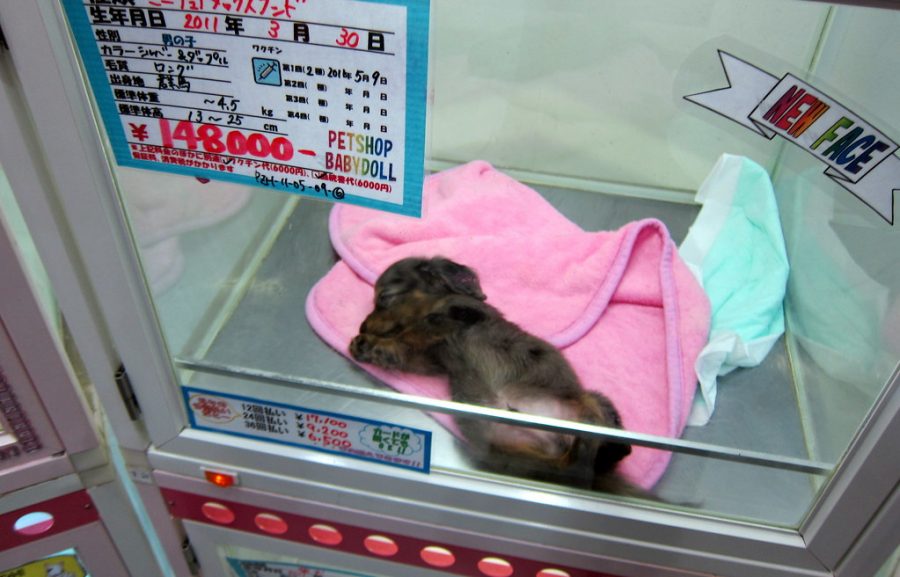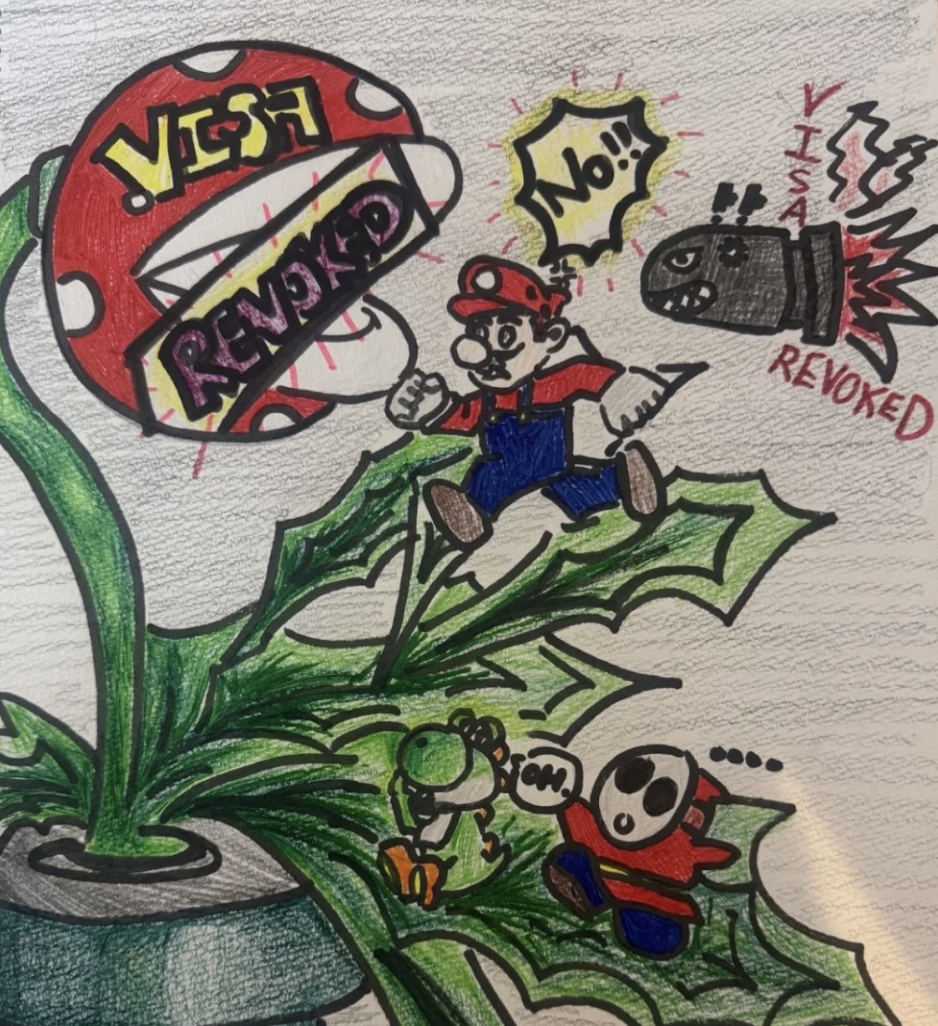The Ugliness of Pet Stores
April 29, 2021
We’ve all walked into pet stores and stared at adorable puppies and kittens through the glass. We comment on how cute they are, stare for a few minutes, then leave. However, their evident cuteness comes with a price beyond the yen the puppies and kittens sell for. There is a dark truth behind the process through which these adorable pets get to a store.
For example, the dogs that we see in pet stores are most often bred in a puppy mill, “an inhumane high-volume dog-breeding facility that churns out puppies for profit, ignoring the needs of the pups and their mother” (The Humane Society). Animals are subjected to terrible conditions in these puppy mills. Mother dogs spend their entire lives in cramped cages, and when they are no longer able to breed, they are abandoned or killed. Furthermore, the animals suffer from a variety of health issues due to poor sanitation, overbreeding, and a lack of preventive veterinary care.
Puppy mills also often exist to serve the purpose of creating certain breeds of dogs that are popular for their looks. Because they must look a certain way for them to be sold on the market, puppy mills subject mother dogs to inhumane torture to create the “perfect” puppy. For example, in Japan smaller dog and cat breeds, such as toy poodles, toy chihuahuas, munchkins, and Scottish folds are popular. Because these breeds need to look a certain “cute” way, more dogs are bred for those characteristics, resulting in an increase of pet mills.
Not only are the animals put through extreme mental and psychological torture, but breeding them in this manner can lead to physical consequences as well. Inbreeding in puppy mills is common because it is cheaper, but puppy mills focus on the appearance and not the health of the animals. The gene mutations that breeding creates can lead to problems such as osteochondrodysplasia (a bone and cartilage development condition), deafness, blindness, and more.
 The animals that are bred are often shipped off to pet stores mere weeks after birth. Like humans, animals need their mothers after birth, but animals bred in puppy mills are denied the necessity of that nurturing in the first months. A majority of those puppies and kittens end up lacking adequate social skills, and develop barking issues and biting habits.
The animals that are bred are often shipped off to pet stores mere weeks after birth. Like humans, animals need their mothers after birth, but animals bred in puppy mills are denied the necessity of that nurturing in the first months. A majority of those puppies and kittens end up lacking adequate social skills, and develop barking issues and biting habits.
Due to the drive of consumer culture and the cute gloss of pet stores, this problem is one that is often not brought to light. Every time a store sells a puppy, another takes its place, creating a harmful and endless cycle of animal abuse. There is no justification for what puppy and kitten mills put animals through. The human desire for a seemingly perfect pet does not justify the horrors that go on in the dark world of those mills.
To take action, we can first spread awareness of this issue. Furthermore, we can encourage others to adopt, not shop. Adopting from animal shelters is a more ethical and affordable method of bringing a pet into our home. We don’t need to stop buying pets―we just need to ensure that when we do, they were born and raised in humane and ethical environments.





















Sena Chang • Apr 30, 2021 at 2:54 PM
Great article! It was incredibly informative while being convincing, which I think is a balance that is difficult to strike. I also liked how you provided opposing viewpoints to this issue and rebutted them—this tells me that you have definitely spent a lot of time researching this issue. Keep up the great work!
Julian • Apr 30, 2021 at 2:49 PM
I like that you had a way to help this issue through adoption and spreading awareness.
Corbin • Apr 30, 2021 at 12:23 PM
I really liked how your article stated the specific things that they do that are bad and what we can do to help. I truly feel bad for the mothers as they are forced to stay in such small cages and not see their puppies and for the puppies as they don’t get to see their mother.
Olivia Saroukos • Apr 30, 2021 at 12:15 PM
Hi Tei, just wanted to comment about how informational this was, and how this really grew my knowledge about the pet stores. This is so sad and horrible – it should be put to a stop. I feel as though I could do my part by simply not going into pet stores anymore, as I used to, as a way to stop giving these stores encouragement.
Yuki • Apr 30, 2021 at 12:13 PM
It’s disgusting how people can exploit animals in that sort of way for money. Thanks for spreading awareness and informing people like me.
Julia • Apr 29, 2021 at 2:56 PM
I thought your article was worth reading because I was one of those people who would walk past pet stores and walk away soon after. I never knew about the cruel situation occurring to these small puppies especially their parents. Seeing many dogs locked into a cage makes me feel very disappointed. Thank you for spreading awareness of this situation.
Matthew Law-Smith • Apr 29, 2021 at 2:52 PM
I think that your article is really good and I like how you have photos of the dogs. I also like how you are able to use a good hook in the start of the writing to remind me of times when I have also gone into the pet stores and done the same thing. However you could further improve the writing piece by adding more data. This would make it a stronger article and more informative.
Saki Kuramoto • Apr 29, 2021 at 12:52 PM
I really liked your article as it included facts about how some kittens and puppies are favored based on their appearance. I wonder if there is a way to help with this issue and not just by spreading awareness.
Jillian Guillemette • Apr 29, 2021 at 12:47 PM
Hi Tei, I learnt a lot from this article and I didn’t know that there was inbreeding and how inbreeding can lead to so many genetic mutations. I like how you included what we can do to help the problem.